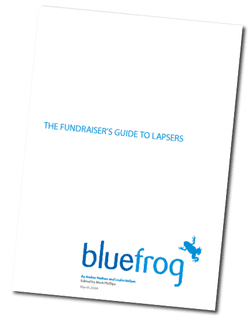Results from massive research study into why donors lapse
 Bluefrog's research into why donors lapse, The Fundraiser's Guide to Lapsers, is now available for download by clicking here.
Bluefrog's research into why donors lapse, The Fundraiser's Guide to Lapsers, is now available for download by clicking here.
As mentioned in a previous post, we were fortunate in having Professor Adrian Sargeant review our work and for very kindly writing the foreword. I'd like to offer him my grateful thanks for the significant amount of time he gave to us.
But perhaps more importantly, without the help of the eleven major British charities who gave us access to their current and lapsed donors for the study this research could not have gone ahead. The sector owes them a huge thanks to which I add my own. They are:
- ActionAid
- Barnardo's
- The British Heart Foundation
- The British Red Cross
- Care International UK
- Centrepoint
- Great Ormond Street Hospital
- Marie Curie Cancer Care
- RNIB
- Sense
- SPANA
But as you might imagine, they were not the only charities that were discussed. Their donors – both lapsed and active – had also given (or were giving) to a range of other organisations.
Over the three months of fieldwork, more than 200 people shared their views, their gripes, their experiences and their recommendations relating to over 100 different organisations.
And if there was one thing that summed up our findings, it is the message implicit in a single statement from one of our participants:
"You keep saying this thing lapsed. Lapsed from what? I never felt I was giving anything up."
The increase in cancellations amongst regular givers (Rapidata's recent analysis now shows this is running at approximately 5% each and every month) shows that the sector is not generating the loyalty that it so desperately needs.
It is too easy and not entirely true to blame the economy for the attrition levels we see today.
Although many donors are very happy with the way that they are treated, many others feel that they lose very little when they withdraw their support. This points to the most important, yet most overlooked element of donor recruitment and development, which is that people give to charities in order to satisfy their own psychological needs – not the needs of the charity.
The answer to this is to place the focus on the donor. Our paper provides seven practical steps that any charity can implement in order to reduce its level of donor attrition and quickly increase available funds. Though much more detail is available in the actual report, the key recomendations are:
- Actively look for ways to start a relationship. Don't just drop new donors into your standard appeal cycle. Engage donors in a dialogue.
- Manage donors' expectations.
Don't think about what you want to tell your donors, think about what they want to hear from you. - Concentrate on answering your donors' needs.
- Allow your donors to choose how and when they want to hear from you.
- Know your donors - listen and remember. And show them that you remember.
- If they do go, part as friends. The best chance you have of reactivating donors is if their last experience of you is a positive one.
A more detailed presentation on specific answers to some of the key problems we uncovered is also available and can be arranged by emailing me at [email protected].
Tags In
Related Posts
1 Comment
Comments are closed.
The Essentials

Crack the Code to Regular Giving: Insights, Strategies, and a Special Giveaway!

‘Tis Halloween. Keep to the light and beware the Four Fundraisers of the Apocalypse!

Why do people give? The Donor Participation Project with Louis Diez.

A guide to fundraising on the back of a postcard

What does the latest research tell us about the state of fundraising?






Donors usually lapse because of illogical issues with risk levels concerned or a lack of funds. Many also fear the paperwork – which is why these days a lot of donors and hospitals use direct debit to get around this obstacle. And I would agree with a lot of people that this sudden upsurge in attrition is because of the weak and unstable economy, rather than any other psychological or physiological reason. The post was a great read though! Keep it up..